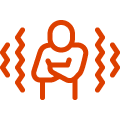
RESOURCES
This page contains additional information about mental health conditions, treatments for mental illness, tips for keeping your brain healthy, and links to a few sites that promote brain healthy living. It is in the process of being updated, so be sure to check back regularly for additional information.

Common TYPES OF DISORDERS
Below are descriptions of some of the most common types of conventionally diagnosed mental health conditions. It is important to note that symptoms often overlap between the different types of diagnosable psychiatric conditions. The classification of these disorders according to commonalities in symptoms is the convention employed by modern healthcare professionals, but this classification does not reflect any fundamental understanding of these disorders as distinct at the biological level. Furthermore, all people are unique individuals that rarely fit discretely into particular diagnostic categories.

Mood Disorders
Everyone experiences sadness from time to time. However, when sadness becomes incapacitating or grows out of proportion to the initiating circumstance, it becomes a symptom of mental disorder. Experiencing an unnaturally elevated mood can also become problematic. Traditional mood disorders include major depressive disorder, dysthymia, premenstrual dysphoric disorder, bipolar I and bipolar II disorders, and cyclothymic disorder. Symptoms of mood disorder often include changes in appetite, energy, sleep, motivation, self-esteem, and concentration. They may also involve things like irritability, impulsivity, anxiety, and racing thoughts.

Anxiety Disorders
Anxiety itself is a natural response to danger or perceived danger. Inappropriate anxiety or anxiety that is disruptive to one’s life is a symptom of psychological disorder. Classification of anxiety disorders includes such diagnosis as generalized anxiety disorder, social anxiety disorder, panic disorder, and specific phobias. In the past, it has also included obsessive-compulsive disorders, which are now grouped separately. Symptoms of anxiety disorders often include fear or worry that is excessive, panic attacks, insomnia, muscle tension, rumination, restlessness, racing heart, poor concentration, GI symptoms (like upset stomach or diarrhea), sweating, trembling, and edginess.

Psychotic Disorders
Psychosis is a mental state that involves losing one’s ability to distinguish between reality and fantasy, and this is the most prominent feature of psychotic disorders. Symptoms of psychosis may include hearing/seeing/feeling/sensing things that aren't there, trouble organizing one's thoughts and behaviors, or believing things that aren't true. Disorders classified according to the primary symptom of psychosis include Schizophrenia, Schizoaffective Disorder, and Delusional Disorder.

Addictive Disorders
The most well-known forms of addiction involve substance use disorders such as alcohol or narcotic abuse or addiction. However, addictive behaviors can also arise surrounding a variety of other phenomenon such as gambling food, sex, shopping, exercise, and work, to name a few. These disorders involve repetitive substance use or behaviors that persist despite having negative impacts on a person's ability to function, fulfill major obligations, enjoy other aspects of their life, or avoid mental or physical harm. They may have direct impacts on physical health as well as emotional wellbeing.

Trauma Disorders
The experience of trauma, particularly during one’s formative years, increases the risk for developing a host of psychiatric and physical disorders, including mood disorders, anxiety disorders, addictions, personality disorders, chronic fatigue syndrome, dissociative disorders, difficulty with anger and aggression, migraines and more. Some disorders, such as post-traumatic stress disorder and acute stress disorder, arise exclusively in the presence of traumatic events. Symptoms of trauma-related disorders can include irritability, nightmares, hypervigilance, mood and anxiety symptoms, and emotional numbing and avoidance.

Personality Disorders
Sometimes psychiatric symptoms arise when we develop habitually detrimental ways of interpreting or interacting with the world. This can create longstanding patterns of unsatisfactory or difficult interpersonal relationships, unstable employment, self-harming behaviors, identity issues, trouble managing emotional reactions, chronic isolation from others, avoidant behaviors, antisocial activities, rigid coping skills or expectations, or over-reliance on others for assistance or self-esteem.






FAQ

What is "mental illness"?
“Mental Illness” is a general term which can be applied to anything from mild symptoms of anxiety to mood swings that are moderately disabling, to severe chronic psychosis. What most forms of mental dysfunction share in common is that they are caused and sustained by a combination of predisposing biological and environmental factors. Most forms of mental illness can be treated and significantly improved by some combination of an appropriate form of psychotherapy, modification of environmental and lifestyle factors, and/or medication management. Mental illness is very common, and having a mental illness or symptoms of mental illness does not at all mean that you are “crazy” or that something is “wrong” with you.
What do people experience symptoms of mental illness?
When the human psyche is either not functioning properly or is under too much stress from internal or external circumstances, it is normal for the brain to exhibit symptoms just like any other part of the human body. As in other types of illness, these psychological signals tell us there is a problem that needs attention.
What are some common symptoms of mental illness?
- Anxiety or excess worry
- Prolonged or extreme sadness
- Loss of interest or pleasure in daily activities
- Sleep problems, such as insomnia, over-sleeping, restless sleep, or nightmares
- Changes in energy, such as sluggishness, fatigue, restlessness, or excess energy
- Irritability or anger outbursts
- Panic attacks
- Poor focus or concentration
- Forgetfulness or memory issues
- Hopelessness, helplessness, or low self-esteem
- Multiple recurring physical complaints, such as headaches, muscle tension, nausea, or diarrhea
- Loneliness or the desire to self-isolate
- Difficulty maintaining relationships or employments
- Jealousy or frequently comparing oneself to others
- Weight or appetite changes
- Obsessive or compulsive behavior
- Addictive behaviors
- Suicidal thoughts or self-harming behaviors
- Impulsivity
- Hearing or seeing things that others don’t
What are some common treatments for mental illness?
Conventional treatments for mental illness include medications, group and individual psychotherapy, and procedures such as transcranial magnetic stimulation (TMS) and electroconvulsive therapy (ECT)
What are some alternative treatments for mental illness?
There are many alternative treatments for mental illness, including exercise and nutrition counseling, herbal medicine functional medicine, meditation, mindfulness, acupuncture, homeopathy, massage, and energy healing, to name a few.
What is psychotherapy?
Psychotherapy is a diverse category of techniques used to treat psychological ailments. The different psychotherapies vary in treatment length, primary goals, and methodology. Some therapies have pre-determined timelines, while others can be more open-ended. Some are guided by written therapy manuals, while others—though relying on specific techniques—are left more to the discretion of the therapist. All therapies involve an interaction between therapist and patients in a 1-on-1 or larger group setting. Psychotherapy, as opposed to counseling, does not necessarily involve bestowing specific advise to a patient. Rather, it often involves facilitating the patient’s own problem-solving capabilities.
What are some types of psychotherapy?
Some common types of psychotherapy include psychodynamic therapy, cognitive-behavioral therapy (CBT), dialectical behavioral therapy (DBT), interpersonal therapy (IPT), group therapy, biofeedback, desensitization therapy, hypnotherapy, and brief therapy, although there are many more.
Who can be a psychotherapist?
Therapists vary significantly by degree and therapeutic orientation. Licensure requirements vary by state, but usually involve a masters or doctoral level degree. Psychotherapy may be provided by a psychiatrist, clinical psychologist, registered psychiatric nurse, clinical social worker, licensed counselor, marriage therapist, or family therapist.
Psychiatrists are the only practitioners who have a medical degree and are able to prescribe medication without restriction to their patients. Psychiatrists must attend college, medical school, and post-graduate training in the medical specialty of psychiatry.
Why does psychotherapy work?
Psychotherapy is a way of using the brain’s own biological processes to help it regulate itself. All of our thoughts, feelings, and behaviors are manifestations of neuronal signaling in the brain. The human brain is highly adaptable to new information and its neurons are constantly reorganizing their connections with one another in response to new stimuli. Thoughts themselves provide feedback to the neurons creating them; that is, every time a memory is recalled or new idea is contemplated, it slightly changes the signaling pathway of neurons that generated it. Therapy provides a new and usually more realistic perspective on thoughts and experiences we may have previously taken for granted. Changing our point-of-view in this way eventually creates lasting positive change in the neurocircuitry responsible for our symptoms or maladaptive behaviors. Therapy works because the brain can actually change itself by thinking about itself.
What is holistic psychiatry?
Holistic psychiatry provides a deeper and more comprehensive way of approaching the problem of mental illness than conventional medicine and psychiatry. Holistic psychiatry is concerned about understanding and addressing the root cause of illness, appreciating a patient’s entire experience and being, and on the interconnection between different aspects of the body and mind as well as external relationships. Holistic psychiatrists may use medications as a treatment option, but also draw from other treatment modalities, such as nutrition, psychotherapy, yoga, mindfulnes, functional medicine, and energy healing. Finally, holistic psychiatry is more concerned with health promotion, preventative treatment, and long-term wellness than conventional psychiatry, which tends to focus more on symptoms and disease.
Why is diet and exercise important to mental health?
Our diet and activity levels profoundly influence our mental and physical health. At a very basic level, everything we eat and everything we do influences how our body regulates itself through the expression of its genes. This has a direct impact on things like gut health and microorganisms, body inflammation, weight, blood pressure, immune regulation, hormone regulation, and nervous system activity, to name a few. Furthermore, chemicals in the food we eat can impact the brain directly, by calming, stimulating, or poisoning neurons, for example.
What is evolutionary psychiatry/medicine?
Evolutionary psychiatry/medicine is an approach to mental health/physical health that incorporates the principles of evolutionary biology into understanding mental health/overall health. In this field we explore how our evolutionary history (the process of evolving into the human species) informs modern health issues and diagnoses. We can then use this information to create better treatment approaches and preventative practices.
Why doesn't this practice accept insurance plans?
I do not accept health insurance directly for several reasons. First and foremost, insurance providers do not reimburse for services based on the best interest of the patient, and often limit access to the type or duration of care they will cover. They also require a mental health diagnosis for reimbursement, and do not cover health maintenance services, preventative services, or treatment for things like life transitions and general life stress. Second, contractual and administrative obligations severely restrict the time I would have available for each patient. This includes time spent squabbling with insurance companies over reimbursement issues, sometimes even years after the original claim. Since I specialize in delivering individually tailored, quality psychiatric services to each of my patients, it is essential that adequate time be allotted to gain a true understanding of the unique difficulties they experience. Finally, insurance billing and reporting procedures also limit my ability to assure patient confidentiality, because I am required to provide diagnoses and documentation to the company covering the service. This may not seem like a big deal at the time, but, due to the stigma that continues to surround mental illness, having a mental health diagnosis on record can lead to issues with things like obtaining life insurance or certain types of employment in the future.
